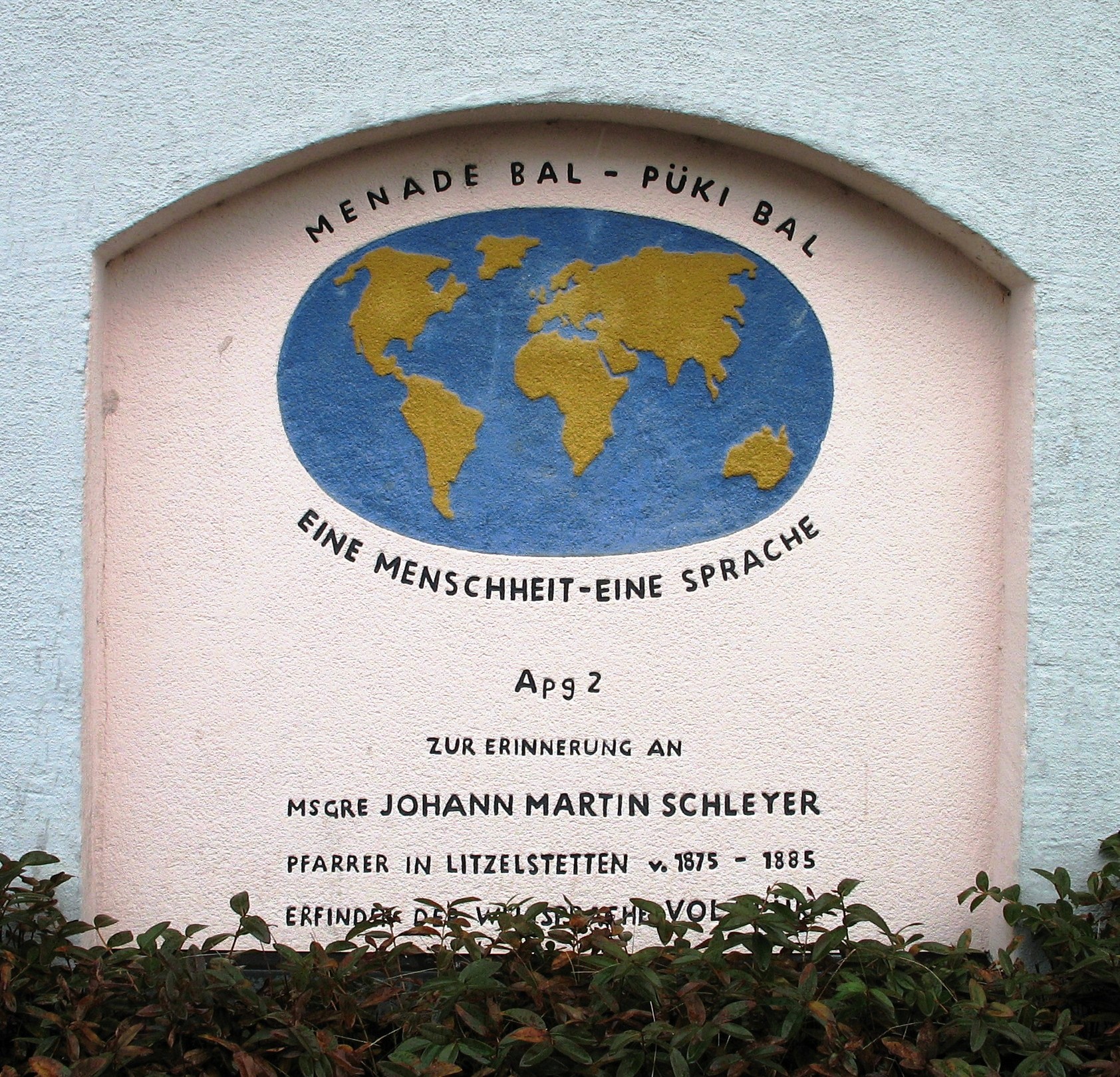|
Léon Bollack
Léon Bollack (1859 – 1925) was a French trader who invented Bolak, a constructed language that also went by the name "the Blue Language", in 1899."H. S. Chapman: Léon Bollack and His Forgotten Project" ''Fiatlingua.org''. Accessed 11 November 2018. Personal His parents were Hermann Bollack and Rachel Léontine Léon (daughter of Moise Léon, founder of the synagogue Buffault in Paris, and Henriette Vissier). The father was from Kreuznach in , Germany, where the family name had been present "fo ...[...More Info...] [...Related Items...] OR: [Wikipedia] [Google] [Baidu] |
Bolak Language
Bolak is a constructed language that was invented by Léon Bollack. The name of the language means both "blue language" and "ingenious creation" in the language itself. History Bollack wrote three books on this language: ''La Langue Bleue Bolak: langue internationale pratique'' (1899), ''Abridged Grammar of the Blue Language'' (1900) and ''Premier vocabulaire de la langue bleue Bolak'' (1902). Bollack caught the attention of H.G. Wells, who wrote in '' A Modern Utopia'': The language of Utopia will no doubt be one and indivisible; all mankind will, in the measure of their individual differences in quality, be brought into the same phase, into a common resonance of thought, but the language they will speak will still be a living tongue, an animated system of imperfections, which every individual man will infinitesimally modify. Through the universal freedom of exchange and movement, the developing change in its general spirit will be a world-wide change; that is the quality of i ... [...More Info...] [...Related Items...] OR: [Wikipedia] [Google] [Baidu] |
Constructed Language
A constructed language (shortened to conlang) is a language whose phonology, grammar, orthography, and vocabulary, instead of having developed natural language, naturally, are consciously devised for some purpose, which may include being devised for a fiction, work of fiction. A constructed language may also be referred to as an artificial, planned or invented language, or (in some cases) a fictional language. ''Planned languages'' (or engineered languages / engelangs) are languages that have been purposefully designed; they are the result of deliberate, controlling intervention and are thus of a form of ''language planning''. There are many possible reasons to create a constructed language, such as to ease human communication (see international auxiliary language and code); to give fiction or an associated constructed setting an added layer of realism; for experimentation in the fields of linguistics, cognitive science, and machine learning; for artistic language, artistic crea ... [...More Info...] [...Related Items...] OR: [Wikipedia] [Google] [Baidu] |
Kreuznach
Bad Kreuznach () is a town in the Bad Kreuznach district in Rhineland-Palatinate, Germany. It is a spa town, known for its medieval bridge dating from around 1300, the Alte Nahebrücke, which is one of the few remaining bridges in the world with buildings on it.Brückenhäuser, Alte Nahebrücke, Neustadt , Bad Kreuznach o www.romantic-germany.info (in English). Retrieved 14 June 2018 The town is located in the Nahe River wine region, renowned both nationally and internationally for ... [...More Info...] [...Related Items...] OR: [Wikipedia] [Google] [Baidu] |
Rhineland-Palatinate
Rhineland-Palatinate ( , ; ; ; ) is a western state of Germany. It covers and has about 4.05 million residents. It is the ninth largest and sixth most populous of the sixteen states. Mainz is the capital and largest city. Other cities are Ludwigshafen am Rhein, Koblenz, Trier, Kaiserslautern, Worms, and Neuwied. It is bordered by North Rhine-Westphalia, Saarland, Baden-Württemberg and Hesse and by France, Luxembourg and Belgium. Rhineland-Palatinate was established in 1946 after World War II, from parts of the former states of Prussia (part of its Rhineland and Nassau provinces), Hesse ( Rhenish Hesse) and Bavaria (its former outlying Palatinate kreis or district), by the French military administration in Allied-occupied Germany. Rhineland-Palatinate became part of the Federal Republic of Germany in 1949 and shared the country's only border with the Saar Protectorate until the latter was returned to German control in 1957. Rhineland-Palatinate's natural and c ... [...More Info...] [...Related Items...] OR: [Wikipedia] [Google] [Baidu] |
Lucien Bollack
Lucien is a male given name. It is the French form of Luciano or Latin ''Lucianus'', patronymic of Lucius. People Given name *Lucien, 3rd Prince Murat (1803–1878), French politician and Prince of Pontecorvo *Lucien, Lord of Monaco (1487–1523) * Lucien of Beauvais, Christian saint *Lucien, a band member of Delta-S * Lucien Bégouin (1908-1998), French politician *Lucien Bonaparte (1775–1840), brother of Napoleon *Lucien Bouchard (born 1938), French-Canadian politician *Lucien Bourjeily, Lebanese writer and director *Lucien Carr (1925–2005), member of the original New York City circle of the Beat Generation * Lucien Dahdah (1929–2003), Lebanese politician *Lucien Macull Dominic de Silva (1893-1962), Sri Lankan Sinhala member of the Privy Council * Lucien Ginsburg (1928–1991), birth name of Serge Gainsbourg *Lucien Greaves (born 1975), social activist and the spokesman and co-founder of The Satanic Temple *Lucien Jack (born 1988), the real name of British singer Jack ... [...More Info...] [...Related Items...] OR: [Wikipedia] [Google] [Baidu] |
Alex Virot
Alexandre Virot (1890 – 14 July 1957) was a French sports journalist, who was active from the 1920s until his death in 1957. He won a silver medal in painting at the 1928 Summer Olympics. Virot died in a motorcycle accident whilst covering the 1957 Tour de France, making him the only journalist to have been killed whilst covering the Tour. Career In his youth, Virot was interested in sports and art courses, with a particular interest in Antoine Bourdelle. Virot fought in the First World War in the trenches and as a trained pilot, and also fought for the French Resistance during the Second World War. Virot drew for the ''Miroir des Sports'', and was asked by the newspaper to cover the 1928 Summer Olympics in Amsterdam. Whilst there, he was awarded the silver medal in the painting event. In the 1920s, Virot also wrote for ''L'Intransigeant''. As a journalist, Virot reported on 22 editions of the Tour de France. In 1929, he broadcast the first radio report of the Tour. In 1932, ... [...More Info...] [...Related Items...] OR: [Wikipedia] [Google] [Baidu] |
Ido Language
Ido () is a constructed language derived from a reformed version of Esperanto, and designed similarly with the goal of being a universal second language for people of diverse languages. To function as an effective ''international auxiliary language'', Ido was designed specifically to be grammatically, orthographically, and lexicographically regular (and, above all, easy to learn and use). It is the most successful of the many Esperanto derivatives, known as '' Esperantidoj.'' Ido was created in 1907 due to a desire to reform the perceived flaws of Esperanto, a language that had been created 20 years earlier to facilitate international communication. The name comes from the Esperanto word ', meaning "offspring", since the language is a derivative of Esperanto. After its inception, Ido was endorsed by some of the Esperanto community. A setback occurred with the sudden death in 1914 of one of its most influential proponents, Louis Couturat. In 1928, promoter Otto Jespersen ... [...More Info...] [...Related Items...] OR: [Wikipedia] [Google] [Baidu] |
Esperanto
Esperanto (, ) is the world's most widely spoken Constructed language, constructed international auxiliary language. Created by L. L. Zamenhof in 1887 to be 'the International Language' (), it is intended to be a universal second language for international communication. He described the language in ''Dr. Esperanto's International Language'' (), which he published under the pseudonym . Early adopters of the language liked the name and soon used it to describe his language. The word translates into English as 'one who hopes'. Within the range of constructed languages, Esperanto occupies a middle ground between "naturalistic" (imitating existing natural languages) and ''Constructed language#A priori and a posteriori languages, a priori'' (where features are not based on existing languages). Esperanto's vocabulary, syntax and semantics derive predominantly from languages of the Indo-European languages, Indo-European group. A substantial majority of its vocabulary (approximat ... [...More Info...] [...Related Items...] OR: [Wikipedia] [Google] [Baidu] |
Volapük
Volapük (; , 'Language of the World', or lit. 'World Speak') is a constructed language created in 1879 and 1880 by Johann Martin Schleyer, a Roman Catholic priest in Baden, Germany, who believed that God told him to create an international language. Notable as the first major constructed international auxiliary language, the grammar comes from European languages and the vocabulary mostly from English (with some German and French). However, the roots are often distorted beyond recognition. Volapük conventions took place in 1884 (Friedrichshafen), 1887 (Munich) and 1889 (Paris). The first two conventions used German, and the last conference used only Volapük. By 1889, there were an estimated 283 clubs, 25 periodicals in or about Volapük, and 316 textbooks in 25 languages;Handbook of Volapük , [...More Info...] [...Related Items...] OR: [Wikipedia] [Google] [Baidu] |
A Modern Utopia
''A Modern Utopia'' is a 1905 novel by H. G. Wells. Because of the complexity and sophistication of its narrative structure, ''A Modern Utopia'' has been called "not so much a modern as a postmodern utopia."Michael Sherborne, ''H.G. Wells: Another Kind of Life'' (Peter Owen, 2010), p. 165. The novel is best known for its notion that a voluntary order of nobility known as the Samurai could effectively rule a "kinetic and not static" world state so as to solve "the problem of combining progress with political stability". Conception of the work In his preface Wells forecasts (incorrectly) that ''A Modern Utopia'' would be the last of a series of volumes on social problems that he began in 1901 with '' Anticipations'' and that included '' Mankind in the Making'' (1903). Unlike those non-fictional works, ''A Modern Utopia'' is presented as a tale told by a sketchily described character known only as the Owner of the Voice, who, Wells warns the reader, "is not to be taken as the Voi ... [...More Info...] [...Related Items...] OR: [Wikipedia] [Google] [Baidu] |
La Revue
LA most frequently refers to Los Angeles, the second most populous city in the United States of America. La, LA, or L.A. may also refer to: Arts and entertainment Music *La (musical note), or A, the sixth note *"L.A.", a song by Elliott Smith on ''Figure 8'' (album) * ''L.A.'' (EP), by Teddy Thompson *''L.A. (Light Album)'', a Beach Boys album * "L.A." (Neil Young song), 1973 *The La's, an English rock band *L.A. Reid, a prominent music producer *Yung L.A., a rapper *Lady A, an American country music trio * "L.A." (Amy Macdonald song), 2007 *"La", a song by Australian-Israeli singer-songwriter Old Man River *''La'', a Les Gordon album Other media * l(a, a poem by E. E. Cummings *La (Tarzan), fictional queen of the lost city of Opar (Tarzan) *''Lá'', later known as Lá Nua, an Irish language newspaper *La7, an Italian television channel *LucasArts, an American video game developer and publisher * Liber Annuus, academic journal Business, organizations, and government agenc ... [...More Info...] [...Related Items...] OR: [Wikipedia] [Google] [Baidu] |



